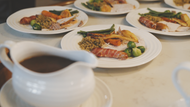The Health Benefits of Turkey
28th Sep 2020
TURKEY meat is not just for Christmas and should be top of everyone’s list of fitness foods according to nutrition scientists.
Top athletes have long known turkey meat should be part of a winning diet.
It has a lower fat content per serving than even chicken and a relatively high amount of protein which helps with muscle building, maintenance and repair. But its benefits don’t end there and it is additional components within turkey meat that transform it into a supreme performance-enhancing food.
Turkey breast contains one of the highest concentrations of an amino acid called beta-alanine which is converted in the body to a compound called carnosine and stored within the muscles. Performance nutritionists have shown in studies how beta-alanine and carnosine help to buffer so-called hydrogen ions that are produced alongside lactic acid during intense exercise. A build-up of hydrogen ions causes an increase in acidity that affects the way muscles relax and contract. The result? Fatigue and tired muscles that cause you to slow down or stop an activity.
So potent are turkey meat’s effects that performance nutritionists at the English Institute of Sport (EIS) advised Team GB athletes to add foods with proven performance-enhancing benefits – including turkey meat - to boost their chances of winning gold at the London 2012 Olympics (1). Dishes such as turkey Bolognese and turkey stir-fry featured on the pre-Olympic menus of many medal winners at the hugely successful Games.
Consuming 150g of turkey meat, approximately the amount in a single turkey breast, would result in an increase in the amount of beta-alanine available to the muscles that is the equivalent of taking an 800mg beta-alanine supplement (2). In trials conducted at the University of Chichester’s School of Sport, Exercise & Health Sciences, nutritionists reported how that amount of turkey breast meat increased muscle concentrations of beta-alanine by 40 per cent, improved cycling performance by 13 per cent and increased performances for other athletes by prolonging training (3).
Many commercial supplements of beta-alanine provide around 1.6g beta-alanine, but even that higher amount is achievable by eating 300g of turkey breast per day (4) – or a turkey breast sandwich for lunch and a turkey breast curry for dinner. The Chichester researchers suggested 250-300g of turkey a day for 6-12 months we would potentially increase in muscle concentrations of beta-alanine by 80 per cent, boosting fitness levels significantly.
Beta-alanine supplementation was shown to increased exercise capacity and boost endurance fitness in a group of middle-aged adults (5) and another paper showed how a 5 week programme of beta-alanine supplementation increased power output in a group of volunteers following a weight training programme (6).
“There is little doubt that turkey breast meat can play a valuable role in an athlete’s diet and will bring benefits to anyone wanting to improve their fitness levels,” says Peta Bee (7), a journalist specialising in sports science and nutrition who is the HFMA Health Journalist of the Year 2020. “Supplements have their place, but there is no substitute for obtaining as many nutrients as you can from real food and it is time to add turkey to your diet.”
References:
- 1.Pickles, Prawns and Turkey: Team GB’s Diet Secrets – The Times, May 12 2012
- 2.The absorption of orally supplied beta-alanine and its effect on muscle carnosine synthesis in human vastus lateralis. Harris RC, Tallon MJ, Dunnett M, Boobis L, Coakley J, Kim HJ, Fallowfield JL, Hill CA, Sale C, Wise JA. Amino Acids. 2006 May; 30(3):279-89.
- 3.Turkey Meat for Athletes, March 2008 British Poultry Council Turkey Research Conference
- 4.β-Alanine supplementation and military performance; Amino Acids; 2015; 47(12): 2463–2474.
- 5.β-Alanine supplementation increased physical performance and improved executive function following endurance exercise in middle aged individuals; Journal of the International Society of Sports Nutrition 2018; 15: 32.
- 6.Effects of β-alanine supplementation during a 5-week strength training program: a randomized, controlled study; Journal of the International Society of Sports Nutrition; 5, Article number: 19 (2018)
- 7.Peta Bee has a degree in sports science and an MSc in nutrition. She is twice winner of the Medical Journalists’ Association’s freelance of the year and the 2020 Health Food Manufacturer’s Association’s Health Journalist of the Year. She is the author of 9 books including the best-seller Fast Exercise, co-written with Dr Michael Mosley.



